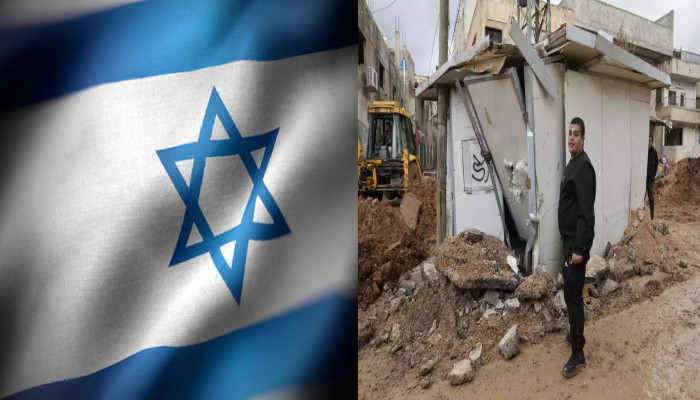West Bank crackdown sparks unprecedented displacement, worst since 1967
- In Reports
- 05:03 PM, Feb 19, 2025
- Myind Staff
In recent weeks, tens of thousands of Palestinians have fled Israeli military operations in the northern West Bank. They have traveled by car and on foot, crossing muddy olive groves and dangerous areas within snipers' sight lines. This is the largest displacement in the occupied territory since the 1967 Mideast war.
On January 21, Israel announced a major crackdown on West Bank militants, just two days after reaching a ceasefire deal with Hamas in Gaza. Israeli forces quickly moved into the city of Jenin, a place they have frequently raided since Hamas' attack on Israel on October 7, 2023. Unlike previous operations, this time Israeli forces advanced deeper into several nearby towns, including Tulkarem, Far’a, and Nur Shams. Their push forced many families to flee, bringing back painful memories of the 1948 war that led to the creation of Israel.
During that war, 700,000 Palestinians were either forced to leave or fled from their homes in what is now Israel. This event, known as the Nakba, or catastrophe, is referred to as such by Palestinians. It led to the creation of overcrowded towns in the West Bank, which are still called refugee camps today. On February 9, as sound bombs exploded in Nur Shams camp, where he was born to parents who had fled the 1948 war, 53-year-old Abed Sabagh packed his seven children into the car and declared, "This is our nakba."
Humanitarian officials say that the level of displacement in the West Bank right now is something they haven’t seen since the 1967 Mideast war. During that war, Israel took control of the West Bank, which lies west of the Jordan River, along with East Jerusalem and the Gaza Strip. As a result, around 300,000 Palestinians were displaced at that time. "This is unprecedented. When you add to this the destruction of infrastructure, we're reaching a point where the camps are becoming uninhabitable," said Roland Friedrich, director of West Bank affairs for the UN Palestinian refugee agency.
According to the agency, about 40,100 Palestinians have left their homes as a result of the current military action. Experts believe that Israel's actions in the West Bank are now very similar to those used in Gaza. Meanwhile, former U.S. President Donald Trump has proposed a plan to relocate large numbers of Palestinians from Gaza. This idea has encouraged Israel’s far-right groups to push for the annexation of the West Bank once again.
Yagil Levy, the director of Britain's Open University's Institute for the Study of Civil-Military Relations, stated that "the idea of cleansing' the land of Palestinians is more popular today than ever before." The Israeli army has denied issuing evacuation orders in the West Bank, stating that its troops only secure passages for those who choose to leave on their own. However, more than a dozen displaced Palestinians interviewed in the past week said they did not leave their homes out of fear but because they were ordered to do so by Israeli security forces. Associated Press journalists in the Nur Shams camp also heard Israeli soldiers using mosque megaphones to instruct people to evacuate. Some families who were displaced recalled that soldiers were polite, knocking on doors and assuring them that they could return once the army left. Others, however, described a different experience, saying the soldiers were harsh—ransacking rooms, waving rifles, and forcing residents out despite their desperate pleas for more time.
Residents have opened their homes to families fleeing from Nur Shams and Tulkarem. "This is our duty in the current security situation," said Thabet A'mar, the mayor of Anabta. However, he emphasised that their hospitality should not be misunderstood. "We insist that their displacement is temporary," he said. When the invasion began on February 2, Israeli bulldozers destroyed underground pipes. Water taps ran dry, sewage overflowed, and internet service was cut off. Schools closed, food supplies dwindled, and explosions echoed throughout the area. Ahmad Sobuh understood why his neighbours chose to flee the Far'a refugee camp during Israel's 10-day incursion. But he chose to stay. He collected rainwater to drink and remained inside his home, determined. Even when Israeli soldiers knocked on his door, he swore to himself, his family, and them that he would not leave. The soldiers advised against it and informed Sobuh's family on February 11 that they would blow up the second floor. They suspected that a room contained security cameras and an object resembling a weapon.
Sobuh explained that surveillance cameras were common in the volatile neighborhood. Israeli soldiers argued that such cameras could be exploited by Palestinian militants. However, families in the area used them to observe street battles and Israeli army operations from inside their homes. The second claim alarmed Sobuh, and he quickly went upstairs. There, he discovered that the suspicious object was his nephew’s water pipe, which was shaped like a rifle. Hours later, an explosion destroyed his nephew's room, leaving it exposed to the wind and shattering most of the other rooms. It became too dangerous to stay. "They are doing everything they can to push us out," Sobuh said, referring to Israel's military.
According to the UN agency for refugees, hundreds of homes across the four camps have been demolished this year. The Israeli army described its ongoing campaign as a crucial counterterrorism effort aimed at preventing attacks like the one on October 7. They also stated that steps were taken to reduce the impact on civilians.
The Israeli army claimed that militants were using civilian infrastructure. It stated that soldiers might have to operate from civilian homes for different periods but added that destroying civilian property was against military rules and values. The army also said that any serious incidents of rule-breaking are thoroughly investigated, though it did not provide details.







Comments